Southern US strawberry festival sparks a race row
- Published
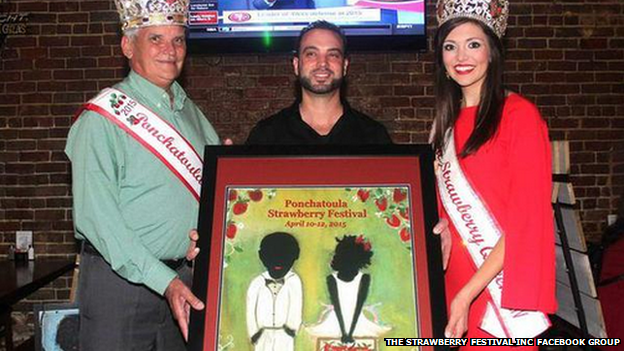
Kalle Siekkinen (centre) won a competition to create this year's poster
A poster for a Louisiana strawberry festival showing two faceless black children has prompted sharply split online opinion over whether it is offensive and racist.
The Ponchatoula Strawberry Festival attracts hundreds of thousands of people to the small city near Lake Pontchartrain every April, and according to organisers is second in popularity in the state only to Mardi Gras itself.
When the festival unveiled its official poster on Wednesday - featuring faceless African American children wearing their white Sunday best and holding a basket of strawberries - it took less than 24 hours to generate bitter disagreement.
Katy Monnot, who runs a community and parenting news group on Facebook, quickly shared the image asking for people's thoughts.
"At first the comments were about how cute the image was and how sweet," Monnot said.
"Then a couple of hours later someone posted, 'Am I the only one cringing a bit here?' followed by another 'I don't like this at all.'"
Within a few hours the post exploded and she had more than 600 comments from all over the US.
Many people said the children are made to look like images from the Jim Crow era or "pickaninnies", a word with negative connotations that refers to caricatures of black children.
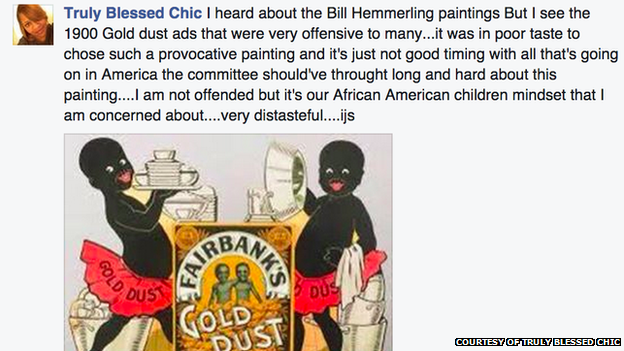
Many were disturbed by the similarities between the poster and Jim Crow era adverts
Some who found the image offensive even called for a boycott of the festival.
Many were upset with the fact that the children appeared to have no facial features, are drawn with large red lips, and in their Sunday best, suggesting that these were the only decent clothes they had.
"It's as if they wanted to remind us of years ago when the strawberry fields were full of black families picking strawberries," said Patricia Morris, president of Greater Tangipahoa Parish chapter of the National Association for the Advancement of Colored People (NAACP).
"The white kids were going to schools early but the black children had to stay to work the fields."
Morris said there were "a lot of remnants of what happened in the 50s in the civil rights movement" in the area.
"These things were really a reality. I was there," she said. "We're gotten past that and you think they have too and then something brings the remembrance of the past back to us."
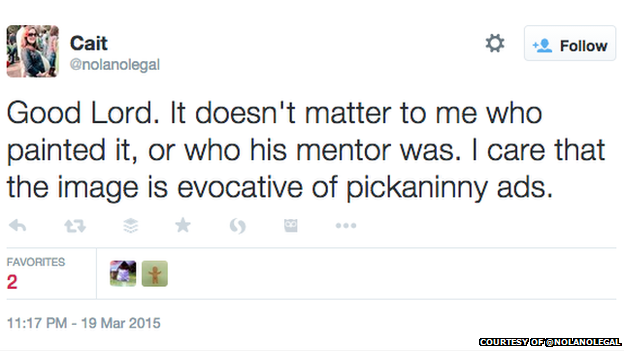
Both white and black members of the local community were upset with the poster
Those unhappy with the image, including Morris, have petitioned Ponchatoula Mayor Robert Zabbia to have it removed.
The mayor, also a member of the Kiwani Club committee who chose the image, released an official statement advising the festival to stop sales of the poster.
"I understand that it has caused hurt among a significant portion of our wonderful community and created division," he wrote.
Morris says that the image might be less insulting if it had been chosen by a group with more racial diversity.
It also comes at a time when many Louisiana school districts are under court order to prevent schools from being segregated by race.
"What are our children supposed to think now?" Morris said.
"We are fighting a 50-year desegregation law. We're trying to get our young kids what they need - this is another slap in the face."
The festival's own Facebook page has almost two hundred comments, one of which called the poster "disgusting".
Some parents had even posted pictures of their own children holding up signs saying "We are not pickaninnies".
But late Friday night it appeared that the group, external disabled their own comments, which can no longer be viewed.
The image has fans as well - it has sold out since it went on sale last week, according to the artist, Kalle Siekkinen, external.
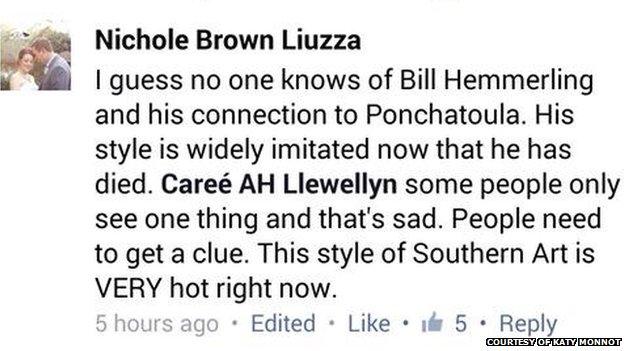
Some people approved of the poster and appreciated it as 'Southern Art.'
Siekkinen, who has a gallery in the French Quarter in New Orleans, said that he is honouring a tradition of southern art, heavily influenced by the work of his late mentor Bill Hemmerling.
"I was shocked and surprised as we rarely if ever have any controversy in the gallery here," Siekkinen told the BBC.
"I see my paintings as silhouettes. People from all races collect them."
Siekkinen said his inspiration came from children in general, not specifically black children.
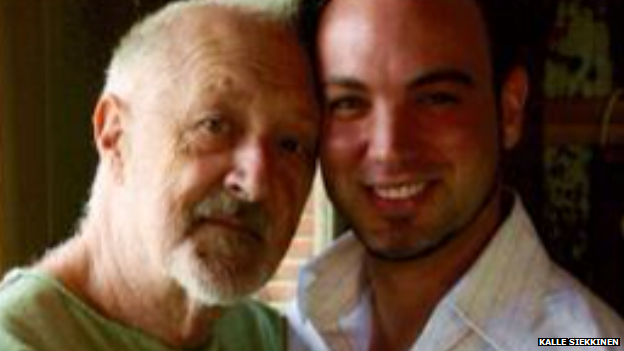
Bill Hemmerling (left) and Kalle Siekkinen
"Black is a mix of all the colours in the world, which come together to make black and the facelessness of characters doesn't mean they are no-one but everyone and anyone you want them to be."
"In no way was it ever an intention for them to appear as if they are harvesting crop," he added.
Hemmerling was from Ponchatoula himself and sold thousands of paintings in the same style to collectors around the world.
Siekkinen in particular was paying homage to a 2008 Strawberry Festival poster by Hemmerling that featured a single girl with a basket of berries, which had also received criticism.
The festival organisers posted a statement, external to Facebook on Friday to announce that they are standing by the poster.
"As we all know, art is subjective; there was no intent other than to pay tribute to the festival and the strawberry industry. This is Kalle's interpretation of a similar world-renowned local Ponchatoula artist, now deceased, who he drew his inspiration from."
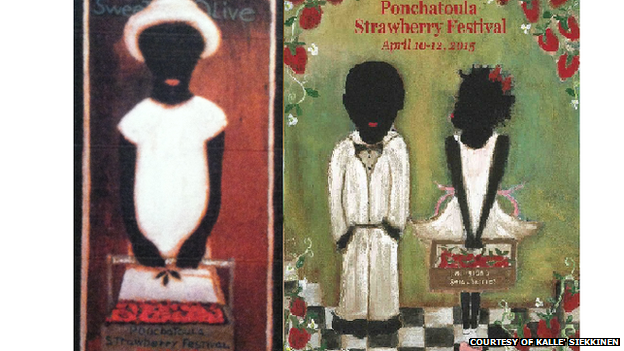
Siekkenin's work (right) took inspiration from his mentor Hemmerling whose artwork (left) was used for the 2008 Strawberry Festival, also causing controversy.
Katy Monnot, who began the online conversation, said that she was not surprised.
"I don't think it occurred to them what they might be doing," she told the BBC.
"The festival is organised predominantly by white people even though people of all races attend the festival. There is definitely a disconnect: This is a small town festival with a small town mind-set."
Blog by Olivia Crellin
Next story: Twitter users attack 'sell-out' black celebrities
Or maybe you'd like to watch: Why did this journalist lose her job?
You can follow BBC Trending on Twitter @BBCtrending, external, and find us on Facebook, external. All our stories are at bbc.com/trending.